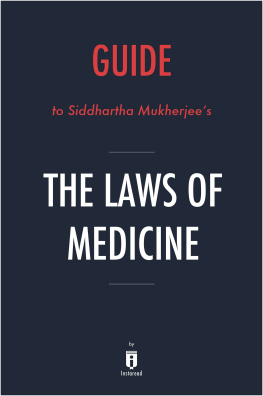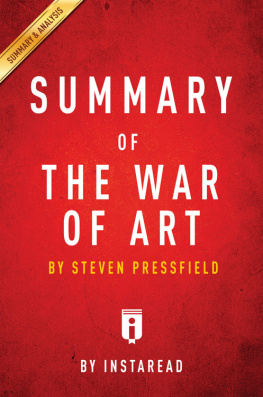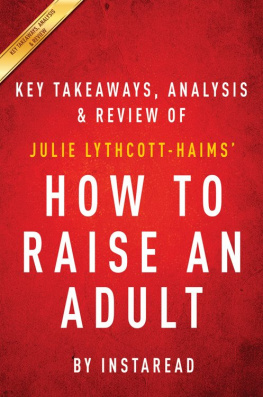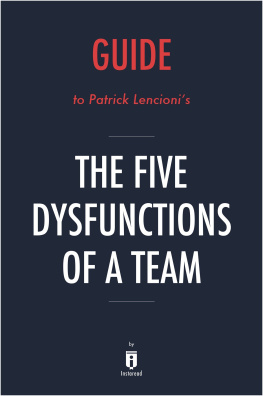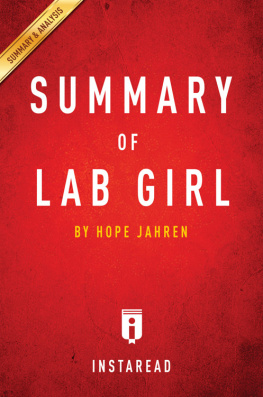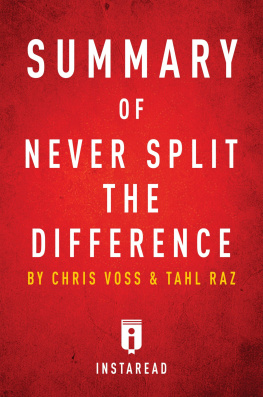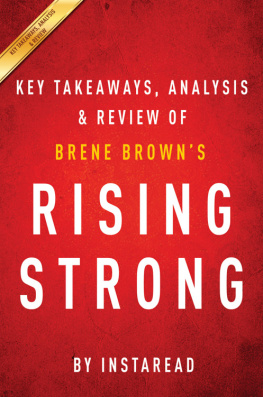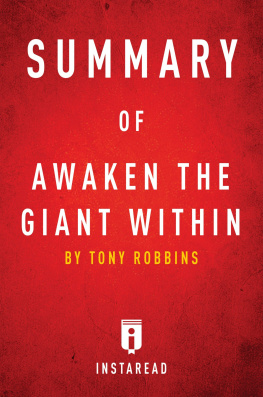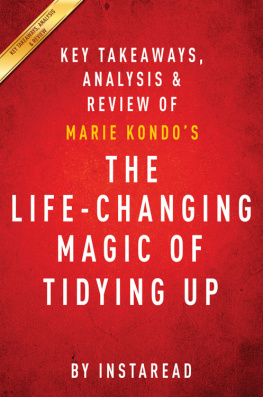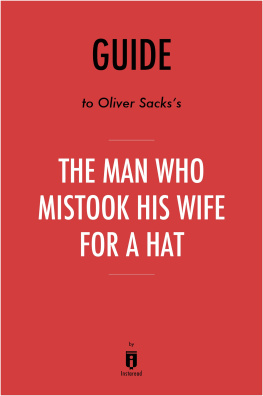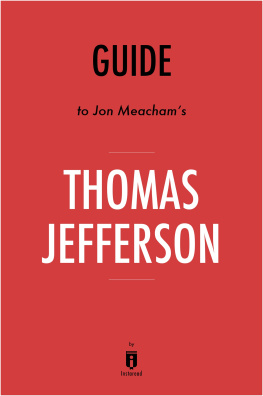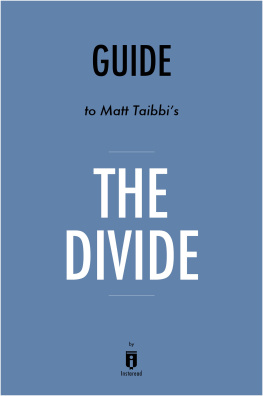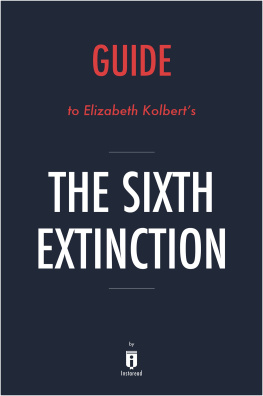Instaread Summaries - The Laws of Medicine: Field Notes from an Uncertain Science by Siddhartha Mukherjee | Key Takeaways, Analysis & Review
Here you can read online Instaread Summaries - The Laws of Medicine: Field Notes from an Uncertain Science by Siddhartha Mukherjee | Key Takeaways, Analysis & Review full text of the book (entire story) in english for free. Download pdf and epub, get meaning, cover and reviews about this ebook. year: 2015, publisher: IRB, genre: Romance novel. Description of the work, (preface) as well as reviews are available. Best literature library LitArk.com created for fans of good reading and offers a wide selection of genres:
Romance novel
Science fiction
Adventure
Detective
Science
History
Home and family
Prose
Art
Politics
Computer
Non-fiction
Religion
Business
Children
Humor
Choose a favorite category and find really read worthwhile books. Enjoy immersion in the world of imagination, feel the emotions of the characters or learn something new for yourself, make an fascinating discovery.
- Book:The Laws of Medicine: Field Notes from an Uncertain Science by Siddhartha Mukherjee
- Author:
- Publisher:IRB
- Genre:
- Year:2015
- Rating:5 / 5
- Favourites:Add to favourites
- Your mark:
- 100
- 1
- 2
- 3
- 4
- 5
The Laws of Medicine: Field Notes from an Uncertain Science by Siddhartha Mukherjee: summary, description and annotation
We offer to read an annotation, description, summary or preface (depends on what the author of the book "The Laws of Medicine: Field Notes from an Uncertain Science by Siddhartha Mukherjee" wrote himself). If you haven't found the necessary information about the book — write in the comments, we will try to find it.
The Laws of Medicine: Field Notes from an Uncertain Science by Siddhartha Mukherjee — read online for free the complete book (whole text) full work
Below is the text of the book, divided by pages. System saving the place of the last page read, allows you to conveniently read the book "The Laws of Medicine: Field Notes from an Uncertain Science by Siddhartha Mukherjee" online for free, without having to search again every time where you left off. Put a bookmark, and you can go to the page where you finished reading at any time.
Font size:
Interval:
Bookmark:
Guide to
Siddhartha Mukherjees
The Laws of Medicine
Field Notes from an Uncertain Science
by
Instaread
Please Note
This is a companion to the original book.
Copyright 2015 by Instaread. All rights reserved worldwide. No part of this publication may be reproduced or transmitted in any form without the prior written consent of the publisher.
Limit of Liability/Disclaimer of Warranty: The publisher and author make no representations or warranties with respect to the accuracy or completeness of these contents and disclaim all warranties such as warranties of fitness for a particular purpose. The author or publisher is not liable for any damages whatsoever. The fact that an individual or organization is referred to in this document as a citation or source of information does not imply that the author or publisher endorses the information that the individual or organization provided. This concise companion is unofficial and is not authorized, approved, licensed, or endorsed by the original books author or publisher.
Table of Contents
The Laws of Medicine: Field Notes from an Uncertain Science is a book that outlines the guiding rules that govern medicine. It is based on the experience of the author, Siddhartha Mukherjee, MD, Ph.D, in the medical field.
When Siddhartha Mukherjee was a medical resident in Boston many years ago, he filled his very tiny amount of free time by reading books about medicine. One of the books he read, The Youngest Science, had a deep impact on him. Before the 1930s, medical intervention was not helpful and its methods were crude. Only when doctors actually stopped these useless therapies and began to actually observe, categorize, and name diseases, was there a revolution in medicine. The profession completely changed and the youngest science was born.
While reading The Youngest Science, Mukherjee began to ask himself whether medicine actually was a science. After all, sciences, such as chemistry and physics, have laws that include statements proven true over and over through observation that can be generalized in every case. Medicine is a soft science with guiding rules rather than hard and fast laws. These rules use intuition instead of tests, pay attention to outliers, and do not underestimate human bias.
Siddhartha Mukherjee: Siddhartha Mukherjee is a researcher and oncologist who writes and speaks about medicine to the public. He is the author of The Emperor of All Maladies: A Biography of Cancer, which won the Pulitzer Prize in nonfiction in 2011.
Dr. Castle: Dr. Castle is a highly competent surgeon and excellent teacher that Dr. Mukherjee observed as a medical student. Dr.Castle taught him about making decisions with imperfect information.
Hermione Granger: Hermione Granger is a character in the Harry Potter series by J.K. Rowling. Granger sees magical laws as a way to understand how to do good in the world, not to do more magic, a concept that Mukherjee applies to medicine.
Lewis Thomas: Lewis Thomas is the author of the book, The Youngest Science. The book inspired Mukherjee to question whether medicine actually was a science, and what the laws of the science of medicine should be.
Mr. Carlton: Mr. Carlton is a patient that Dr. Mukherjee sees during his intern year. Mr. Carlton teaches the doctor a valuable lesson about trusting intuition and using observation to aid in diagnosis.
Thomas Bayes: Thomas Bayes was an early 18th century English philosopher and member of the clergy. Bayes theorem posits that even in the case of probability, knowledge is conditional, not absolute.
Johannes Kepler: A German mathematician working in the 16th century, Kepler was given the task of solving the problem of why Mars looked like it was orbiting backwards, disrupting the accepted model of how the planets orbited the sun. Kepler used Marss exceptionalism to create the theory that the planets orbited in an ellipsis around the sun, which is now accepted to be true.
- In medicine, doctors often make decisions based on fragmentary information.
- Modern medicine only dates back to the 1940s. Before then, the choices were amputation, and the three Ps--placebo, palliation, and plumbing.
- Sharp intuition and observation are much more important than a test that is not very predictive. Tests need to be interpreted with information the doctor already knows.
- Bayes theorem states that there is no actual knowledge, only conditional knowledge, even in probability
- Regular cases create a working set of rules, but the outliers prove the laws.
- Bias is prevalent in medicine, and the problem of bias will only increase with more data.
In medicine, doctors often make decisions based on fragmentary information.
Analysis
Mukherjee observed surgeon, Dr. Castle, working with a resident who was substituting in a surgery for another resident and, therefore, had not read the patients chart. Things started to go wrong in the surgery and the resident asked about the patients history in hopes that it would help him determine how to proceed. Dr. Castle told him he did not need to know the history to proceed. The resident ended up doing a great job.
Imperfect information is a huge problem in medicine. This is especially true in the emergency room. The emergency room presents situations where a doctor has to act much like Dr. Castles resident because the history of the patient is often unknown. This is compounded by the fact that the nature of an emergency forces the emergency room physician to act quickly with little information. At Cook County Hospital in Chicago, doctors wanted to find a way to more accurately diagnose the severity of cardiac events in the emergency room. They narrowed the information they needed to determine whether a patient was experiencing a significant cardiac event to an electrocardiogram and a few clinical predictors that included blood pressure and chest pain. They found that by using this system, they admitted fewer patients into intensive care and all patients got the care they required [1]. Like Dr. Castles resident, in the face of imperfect information they found a way to make smart decisions.
Modern medicine only dates back to the 1940s. Before then, the choices were amputation, and the the three Ps--placebo, palliation, and plumbing.
Analysis
Before diseases were understood, medine usually had a net zero or deleterious effect because doctors did not truly understand what was happening on a physiological level. The choices were to amputate the problematic body part, use a medicine that did not work, offer a painkiller, or purge the body through a laxative or diuretic.
Although there were some advances in how medicine was practiced in the 19th century, such as in terms of hygiene and a better understanding of germs, doctors still did not understand many of the basics tenets of medical science. An example of this is the practice of bloodletting or bleeding a patient, which persisted into the 19th century and even into the 20th century [2]. This practice was based on the idea that disease came from an imbalance of fluid and pressure in the veins. George Washington was bled when he came down with laryngitis and died shortly afterward. Historians debate whether this bleeding was a possible cause of his death. Although modern doctors have found that there are a few specific cases in which bleeding would help, the entire concept demonstrated a lack of understanding of how disease works. In this aspect, medical science was light years behind areas like physics and astronomy, where the basic tenets were hammered out before the turn of the 20th century.
Next pageFont size:
Interval:
Bookmark:
Similar books «The Laws of Medicine: Field Notes from an Uncertain Science by Siddhartha Mukherjee»
Look at similar books to The Laws of Medicine: Field Notes from an Uncertain Science by Siddhartha Mukherjee. We have selected literature similar in name and meaning in the hope of providing readers with more options to find new, interesting, not yet read works.
Discussion, reviews of the book The Laws of Medicine: Field Notes from an Uncertain Science by Siddhartha Mukherjee and just readers' own opinions. Leave your comments, write what you think about the work, its meaning or the main characters. Specify what exactly you liked and what you didn't like, and why you think so.

